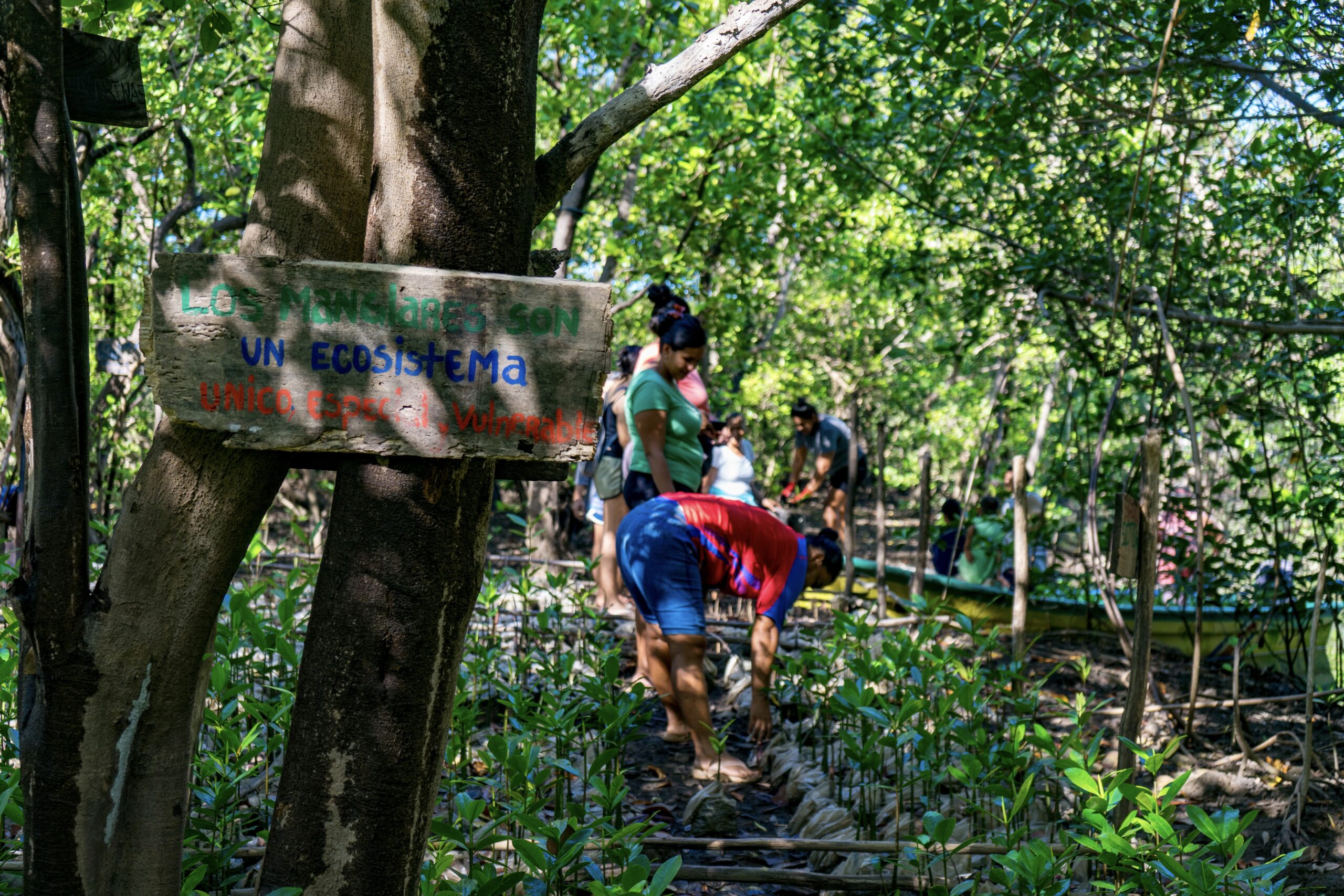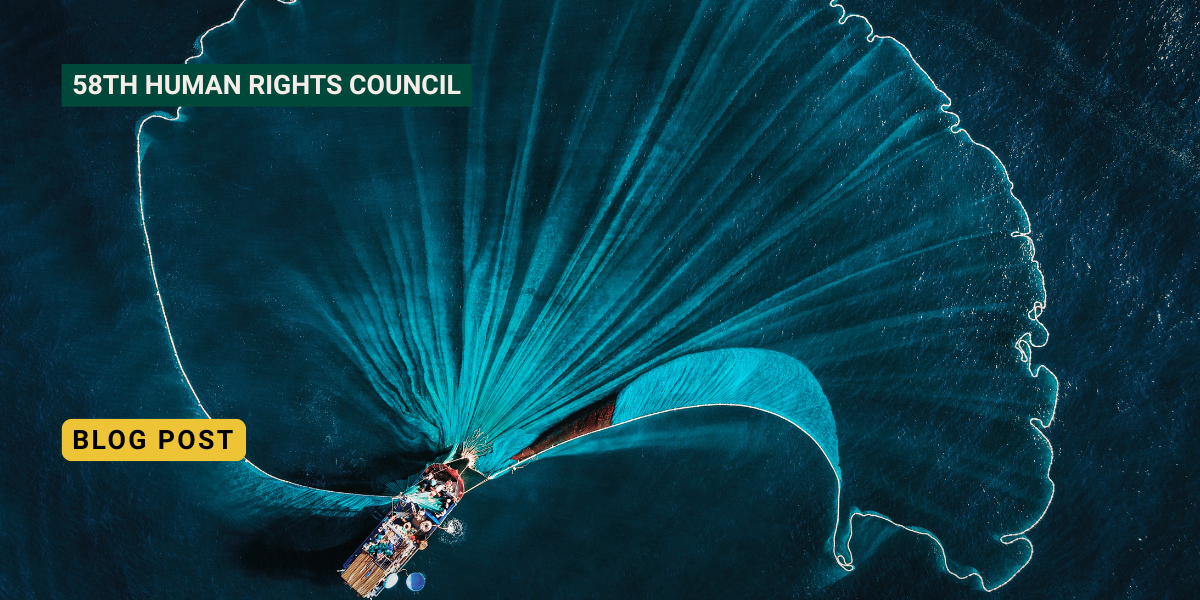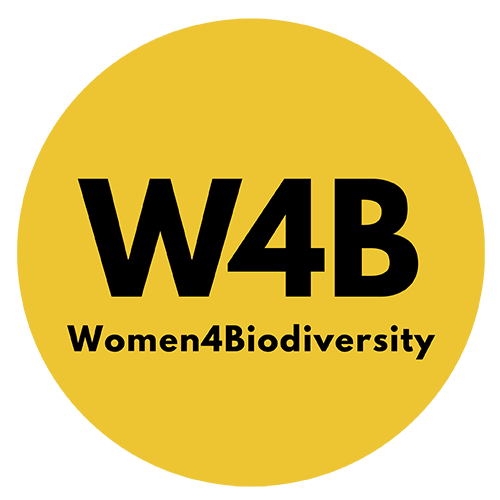This article was produced during the 58th Session of the Human Rights Council (HRC), that took place from 24 February 2025 to 4 April 2025. The HRC adopted the Resolution (A/HRC/58/L.26/Rev.1) The human right to a clean, healthy and sustainable environment: the ocean and human rights on 4 April 2025.
At the Human Rights Council (HRC) 58th session, a pivotal report, « The ocean and human rights« , by the Special Rapporteur on the human rights to a clean, healthy, and sustainable environment, Astrid Puentes Riaño addressed the intersection of human rights and the ocean, highlighting the urgency of ocean conservation in the face of biodiversity loss. This report provides a comprehensive understanding of the ocean’s role in sustaining life on Earth, not only from an environmental standpoint but also as a human rights issue, especially for women and Indigenous Peoples, who are often the most vulnerable to the consequences of ocean degradation.
Ocean Conservation and Human Rights
The ocean covers over 71% of the Earth’s surface and is critical in regulating the planet’s climate and supporting biodiversity. It provides food for billions of people, especially in coastal and island nations, and is a source of economic activity through fishing, tourism, and trade. However, rapid industrialization, overfishing, pollution, coastal and marine biodiversity loss and climate change are accelerating the degradation of marine ecosystems, leading to multiple stressors to ocean acidification and harmful algal blooms. The HRC 58 session report emphasizes that this environmental crisis also translates into human rights violations. As marine resources dwindle and ecosystems collapse, the fundamental rights of people who depend on the ocean for food, livelihood, and cultural practices are threatened. Astrid’s report strongly connects the degradation of the ocean and its impact on human communities, asserting that the right to a healthy environment, recognised by international human rights law, is increasingly under threat. This includes the loss of access to clean water, food security and the infringement of the rights of communities whose survival depends on sustainable marine ecosystems.
Biodiversity Loss: A Crisis with Human Consequences
Biodiversity loss, both on land and in the ocean, is one of the most pressing environmental crises of our time. The report highlights that the destruction of marine biodiversity has far-reaching effects beyond ecological imbalance. For coastal communities, especially those in developing nations, the depletion of marine species means the collapse of critical food sources. Moreover, the report points out that biodiversity loss contributes to the erosion of cultural identities for many indigenous groups whose traditional practices are closely tied to the sea. The loss of coral reefs, for instance, threatens marine species and weakens coastal protection, exacerbating local populations’ vulnerability to climate change-related disasters such as hurricanes and tsunamis. Such ecological degradation disproportionately impacts marginalized communities that have limited access to alternative resources or means of adaptation.
Women and the Ocean: Gendered Impacts of Ocean Degradation
Women, especially in coastal and indigenous communities, often bear the brunt of the ocean’s deterioration. The HRC 58 session report sheds light on the gendered dimensions of ocean conservation, noting that women are frequently the primary gatherers of marine resources, including fish and shellfish, for household consumption and sale and lack of data. As marine biodiversity declines, these essential resources become harder to access, leading to increased workloads and economic instability for women. Additionally, the report discusses the impact of ocean degradation on women’s health and well-being. The depletion of fish stocks, the contamination of water sources, and the loss of traditional knowledge about sustainable fishing practices place a unique burden on women, who often have the responsibility of ensuring food security and nutritional health for their families. The report states that women account for almost half of the global fishing workforce, where women’s traditional knowledge and rights are often overlooked. Women in these communities are also at the forefront of efforts to conserve marine ecosystems.
Indigenous Peoples and the Ocean: Custodians of Marine Biodiversity
Indigenous peoples have long been the stewards of marine ecosystems, practicing sustainable fishing methods that have maintained the delicate balance of biodiversity for generations. The report emphasizes that the loss of biodiversity and the degradation of the ocean threaten not only the physical environment but also the cultural rights of indigenous communities. For many indigenous groups, the ocean is not merely a resource but an integral part of their identity, spirituality, and traditions. Astrid’s report urges that Indigenous Peoples’ knowledge and practices must be acknowledged and integrated into contemporary conservation strategies, including their Free, Prior, and Informed Consent (FPIC). Indigenous communities are often at the frontline of environmental advocacy, fighting against exploitative practices that harm the ocean and their way of life. Unfortunately, these communities often face marginalization in policy discussions despite their deep understanding of ecological balance and sustainable resource management. They are also “Ocean defenders” and acknowledge that they are also human rights defenders. Though their roles and contributions are often under-recognized in decision-making processes related to ocean management, protecting them is a prerequisite for effectively and equitably protecting the ocean and the rights of current and future generations.

Women mollusk collectors rely on healthy mangroves not just for their daily catch but for their families’ futures in Chomes, Costa Rica. These coastal forests protect marine life, support livelihoods, and act as a frontline defense for ocean health. Image credit: Annie Means/CoopeSoliDar R.L, 2024
The Way Forward: Protecting Oceans, Protecting Rights
The HRC 58 session report by Astrid calls for an integrated approach to ocean conservation that prioritizes human rights, including the rights of women and indigenous peoples. It emphasizes that the protection of the ocean is not only an environmental issue but also a matter of justice. Governments and international organizations must adopt policies that recognize the interconnectedness of environmental health and human well-being, ensuring that the voices of marginalized groups are central in shaping the future of ocean governance.
Key recommendations
The following is a list of recommendations from the report[1].
- Protect Marine Areas & Ecosystems: Prioritize the protection of fragile ecosystems, ensuring human rights of marginalized groups (Indigenous Peoples, coastal communities, women) through participatory processes and co-management, and prohibit harmful activities like mining and unsustainable industrial fisheries.
- Conduct Impact Assessments: Undertake comprehensive environmental and human rights assessments before approving activities that could harm the ocean, including offshore projects, industrial fishing, and urban developments, with an ecosystem-based and intersectional approach.
- Upholding Precautionary Principle: No extractive activities, such as mining or trawling, should occur in vulnerable ocean areas unless scientific certainty shows no risk of irreversible harm, and strong safeguards and regulations should be implemented.
- Reduce Pollution & Emissions: Prioritize controlling emissions from shipping and industrial sectors, halt new offshore oil and gas projects unless thoroughly assessed, and address ocean plastic pollution through strong regulations and international cooperation.
- Control Ocean Plastic Pollution: Strengthen regulations and international cooperation to phase out and remediate plastic pollution across its lifecycle.
- Protect Human Rights of Coastal & Marginalized Communities: Recognize the rights of coastal communities, Indigenous Peoples, small-scale fishers, and marginalized groups to access and manage resources, ensuring their participation in decision-making processes.
- Support Environmental Defenders: Provide a safe environment for environmental human rights defenders protecting the ocean, ensuring their vulnerability is addressed with an intersectional approach.
- Gender-Responsive Approaches: Ensuring that gender considerations are included in marine conservation policies will help address the disproportionate impact that ocean degradation has on women and improve community resilience.
- Ensure Control Over Industrial Fisheries: Regulate industrial fisheries using the best science, prioritising biodiversity conservation and small-fisher community rights, and eliminate harmful subsidies by ratifying international agreements on fisheries.
- Control Ocean Plastic Pollution: Strengthen regulations and international cooperation to phase out and remediate plastic pollution across its lifecycle[2].
- Promote Human Rights in Blue Economy Initiatives: Implement blue economy strategies with a human rights approach, ensuring sustainable resource use, preventing false solutions, and incorporating traditional knowledge, especially in restoration efforts.
- Restore Ocean & Coastal Ecosystems: Prioritize the restoration of fragile ecosystems like coral reefs and mangrove forests, ensuring inclusive participation and valuing ancestral knowledge.
- Promote Multilateral Cooperation: Strengthen cooperation among states, businesses, and the UN system to protect ocean resources, ensuring transparent funding, inclusive research, and adherence to international human rights standards.
- Strengthening International Legal Frameworks: There is a need to expand and enforce international agreements that protect marine biodiversity and promote sustainable use of ocean resources, such as the United Nations Convention on the Law of the Sea (UNCLOS). This includes applying the precautionary principles to effectively protect ocean and coastal ecosystems, including alignment with other Multilateral Environment Agreements.
Conclusion
The HRC 58 session report by Astrid highlights the urgent need for a human rights-based approach to ocean conservation. As biodiversity loss accelerates, not just the ocean is at risk—it is the people who depend on it. Protecting the ocean means protecting the rights of vulnerable groups, including women and Indigenous peoples. Conservation efforts must be inclusive, recognizing the intertwined nature of environmental sustainability and human rights. These recommendations aim to integrate human rights and sustainability into ocean governance, focusing on the protection and restoration of ecosystems and the rights of affected communities.
Through collaboration, respect for traditional knowledge, and a commitment to justice, we can ensure a future where the ocean remains a source of life, culture, and prosperity for all. The Human Rights Council 58th Session adopted the Resolution on The human right to a clean, healthy and sustainable environment: the ocean and human rights.
Footnotes
-
Detailed Conclusion and recommendations of the HRC 58 Report on the Ocean and Human Rights (A/HRC/58/59)
-
Approximately 14 million tons of plastic enter the ocean annually, constituting 80% of all marine debris,an amount projected to triple by 2040.
Post script: Women4Biodiversity attended the Human Rights Council’s 58th Session and co-organised various side events highlighting the importance of Core Human Rights Principles for Private Organisations and Funders, Human Rights and Marine Protected Areas and Ocean Issues is a Human Rights Issue. Please watch the replays below.


